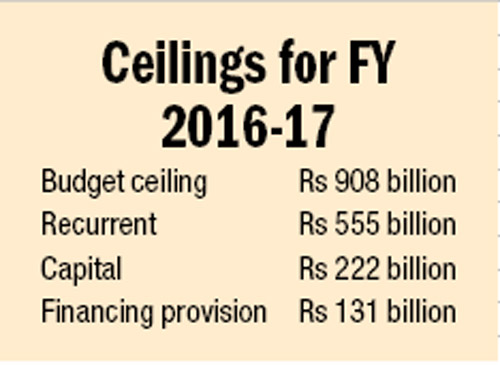NPC caps next year’s public expenditure at Rs 908 billion
The National Planning Commission (NPC) has directed ministries to embrace frugality and focus on cost effectiveness while formulating budgetary programmes of fiscal year 2016-17, as it proposed capping next fiscal’s public expenditure at Rs 908 billion — up 10.80 per cent than in the current fiscal.
Issuing the budget formulation guideline today, the NPC, the apex body that frames the country’s development plans and policies, recommended that recurrent expenditure be limited at Rs 555 billion in the next fiscal year.
The proposed amount is 14.61 per cent higher than in the current fiscal year.
Although the size of the proposed recurrent budget has been raised by almost 15 per cent, capital expenditure for next fiscal year has been capped at Rs 222 billion — up 6.28 per cent than in the current fiscal year.
Considering inflation of 12.1 per cent in January, it could be said the size of the capital budget is likely to squeeze in real terms in the next fiscal year, which means spending on activities like civil works and purchase of land, building, plants and machinery — required for the country’s development — are likely to take a dip.
The combination of surging recurrent expenditure and falling capital spending cannot be considered as prudent because recurrent budget is used for purposes like salary payment of civil servants, which generally ends up being used for consumption, while capital spending helps in capital formation process. And higher capital formation is necessary for countries like Nepal which is gearing up for higher trajectory of economic growth.
A high-ranking NPC official, however, said the amount proposed for next fiscal year’s capital expenditure may be reviewed in the coming days, as ‘budget for the National Reconstruction Authority, the body that is overseeing and implementing post-earthquake reconstruction works, has not been fixed yet’.
“We extended the ceiling today so that other ministries could start framing programmes for the next fiscal, as the NPC has already fallen behind the deadline of extending budgetary ceiling. So, the figures may be revised,” the official said.
The NPC generally extends budgetary ceiling to all the ministries right after the end of the first half (mid-January) of the fiscal year. Based on this figure, the Ministry of Finance (MoF) frames the annual spending plan, also known as annual budget. Other ministries also refer to the ceilings extended to them to design programmes for upcoming fiscal year.
While extending the budgetary ceiling to different ministries, the NPC also provides a guideline on budget formulation.
This year’s guideline has directed all the ministries to adopt frugality and cost effectiveness as guiding principles during budget formulation process.
“Budget for meetings, seminars and workshops in the next fiscal year should be reduced by 25 per cent than in the current fiscal year. Also, offices, except for the newly established ones, should not be allowed to purchase new vehicles. And proposals should be made to merge small projects of similar nature,” says the guideline.
The NPC has directed all the ministries to adopt austerity measures as the government’s revenue collection has been affected this fiscal by supply disruption along Nepal-India border points.
“Because of this, the MoF has not been able to fix revenue target for the next fiscal year,” the official said, adding, “The MoF has to make next year’s projection based on this year’s figure, but revenue collection has remained erratic this fiscal.”
Inability to project next fiscal’s revenue collection target, on the other hand, has made it difficult for the NPC to fix domestic debt mobilisation target for the next fiscal year.
“We hope the MoF will come up with revenue collection target for next fiscal year soon. Once we get that figure, we can chart out ways to cover next fiscal’s expenditure,” the official said.






